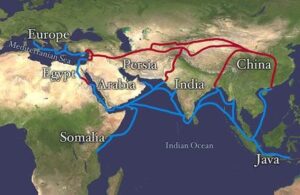- Explain what globalization is and how it is related to business
- Understand why absolute and comparative advantage make companies want to do business in foreign markets
- Understand the difference between balance of trade and balance of payments
- Understand the difference between trade deficits and trade surpluses
What Is Globalization?
There was a time when consumers only had access to goods and services that were available locally. Their choices were limited by what they could access on foot, by horse, or by carriage. This is still the case for many people around the world. In some rural parts of the U.S., it’s still necessary for families to travel a significant distance to stock up on food, household items, and other necessities.

With the rise of Internet-based business (think Amazon and AliExpress), there’s been an explosion of international trade. More and more consumers essentially have the world delivered to their door. Global business (or international business) refers to activity that happens when goods, services, or resources cross the borders of two or more nations. Trade across borders and between cultures has been a feature of human civilization for centuries. In addition, trade is widely recognized as the goal of colonialism throughout history, where one country exerts physical, political, and economic control over a less developed one.[1]
In contrast, globalization is a shift toward a more integrated world economy in which culture, ideas, and beliefs are exchanged as a part of global business. As a result of new transportation and communication technologies, people around the world can more readily connect with one another, both virtually and geographically, and learn from each other.
globalization
Globalization is much broader than just trade between nations. The concept of globalization encompasses the sharing and adopting of culture, ideas, and beliefs as international business takes place. It also includes how world economies become more integrated as countries trade and become more reliant on each other for resources.
Working in Another Country
You can view the transcript for “Living On $24K A Year In Seoul, South Korea” here (opens in new window).
You can view the transcript for “How I Raised $40 Million To Give Rural Farmers Solar Power.” here (opens in new window).
You can view the transcript for “How We Retired Early In Portugal” here (opens in new window).
- Kleiman, Ephraim. “Trade and the Decline of Colonialism.” The Economic Journal 86, no. 343 (1976): 459–80. https://doi.org/10.2307/2230793 ↵